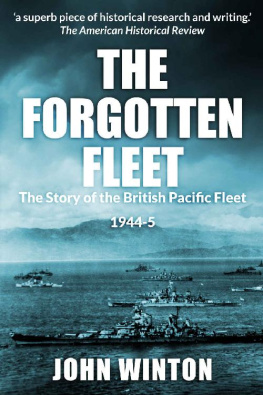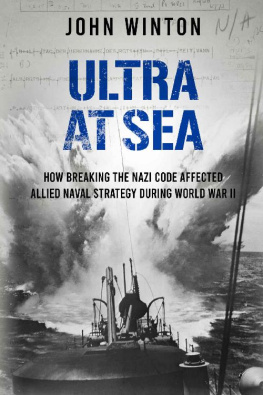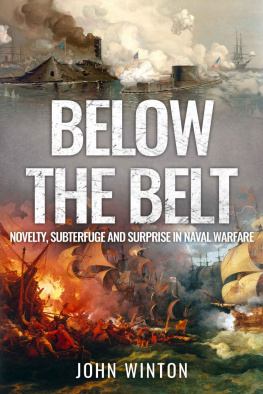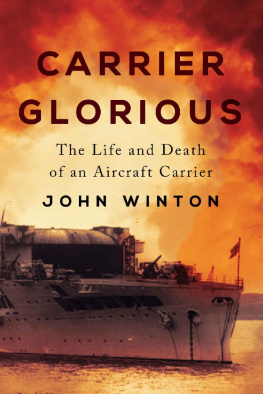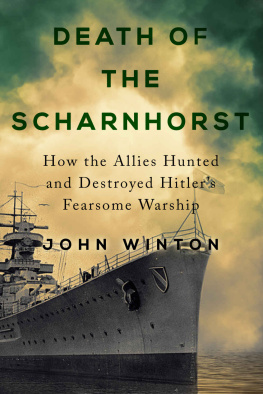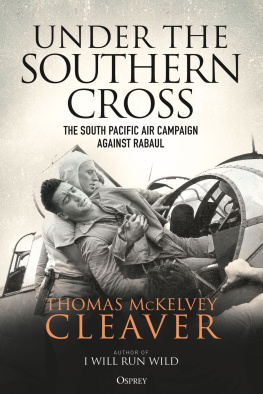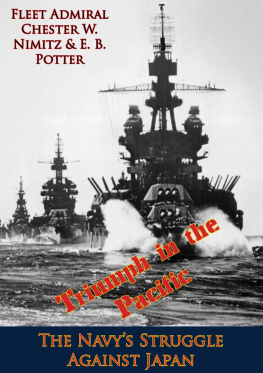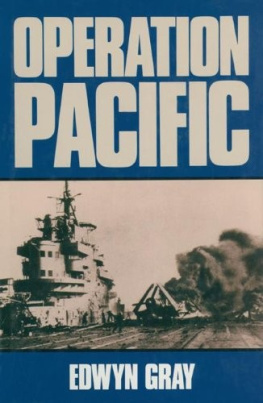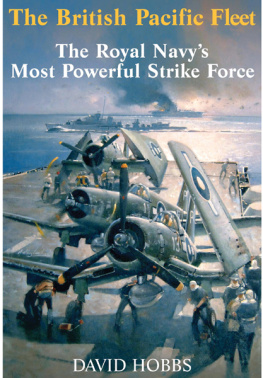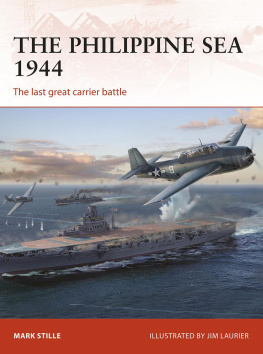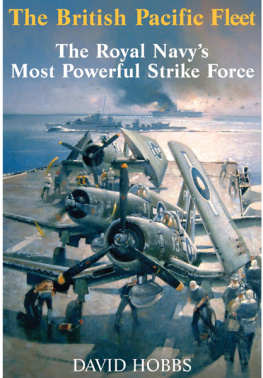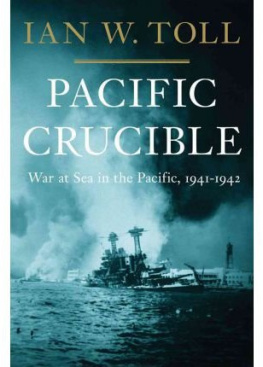THE FORGOTTEN FLEET
The Story of the British Pacific Fleet
1944-5
John Winton

TABLE OF CONTENTS
PREFACE & ACKNOWLEDGMENTS
I BELIEVE that many people, here and in the United States, are still quite unaware that the British had two large fleets operating against the Japanese in the last year of World War Two. The general assumption appears to have been that victory at sea in the Far East in 1945 was entirely the achievement of the United States Navy. I hope that this book will go a little way towards putting the record straight and, belatedly, giving credit where it is due.
The book is intended to be a record of the operations of the East Indies and British Pacific Fleets, with enough information on the political and strategic background to place those operations in perspective. I have omitted a full account of the Commander-in-Chief, British Pacific Fleets relations and negotiations with the Australian and New Zealand Governments in 1944 and 1945, because I felt that this was better left to Lord Frasers eventual biographer. However, I have included for the sake of completeness a chapter on the Navys part in the third campaign in the Arakan, although unfortunately I was not able to find room for eye-witness comments and contributions. Perhaps this complex, fascinating and almost totally forgotten piece of naval history deserves a book of its own.
The book could not have been written without the help of a great many people who very kindly wrote and talked to me of their experiences, lent me books, documents and photographs, and corrected my drafts. Amongst them I would particularly like to thank Lady Rawlings; Admiral of the Fleet The Earl Mountbatten of Burma, Admiral of the Fleet Lord Fraser of North Cape, and the late Admiral of the Fleet Sir Philip Vian; Admiral Sir Charles Daniel, Admiral Sir Michael Denny, Admiral Sir Michael Le Fanu, Admiral Sir Richard Onslow, Admiral Sir Manley Power and Admiral Sir Peter Reid; Vice Admiral Sir Hilary Biggs, Vice Admiral Sir Edward Evans Lombe, Vice Admiral Sir Norman Dalton, Vice Admiral Sir Arthur Hezlet, and Vice Admiral Sir Charles Hughes Hallett; Rear Admiral J. G. C. Given, Rear Admiral Sir Alexander McGlashan, Rear Admiral A. D. Nicholl, Rear Admiral R. W. Parker, and Rear Admiral W. K. Weston; Captain Eric Bush, Captain Tom Harrington, Captain T. G. V. Percy, Captain John Robathan, Captain Henry F. Waight and Colonel Peter Norcock, Royal Marines; Commander Denis Calnan, Commander Michael Crosley, Commander Graham de Chair, Commander D. Holt Wilson, Commander C. A. Jenkins, Commander John Rennie and Major V. B. G. Cheesman, Royal Marines; Lieut. Cdr. Leslie Ellis, Lieut. Cdr. A. M. Tuke, Lieut. Cdr. David Swanston and Lieut. Cdr. Robert F. Morris, USNR; Rt Rev. Gerald Ellison, Bishop of Chester; Rt Hon. John Silkin, MP; Mr R. G. Auckland, Editor of The Falling Leaf , Journal of the Psywar Society, Mr John Baggs, Rev. J. G. Barnish, Mr Eric W. Beeny, Mr V. M. G. Bennett, Mr Richard Bigg-Wither, Mr H. C. Caistor, of St Helens Public Library, Mr D. Cartin, Mr Geoffrey Cook, Miss Rose Coombs and the Imperial War Museum Library, Mr George Dennison, Mr David Divine of The Sunday Times , Mr Richard Douglas-Boyd, Mr Tom Dyke, Mr Colin Facer, Mr W. Fenwick-Smith, Mr Norman Hanson, Mr Alan Humphreys of Reuters, Lieut. Cdr. P. K. Kemp and the Admiralty Library, Miss Anne Mackenzie, Secretary of the Fleet Air Arm Officers Association, Mr Andrew Morgan, Mr Derek Parfect, Mr Bill Rawlings, Mr P. G. W. Roome, Lieut. Cdr. Ken Talbot, Editor of Flight Deck , Mr A. M. Tritton, Mr Francis Tufton, Mr G. G. Turnbull of NAAFI, Mr Jack Waterman, and Chief Petty Officer B. J. Wilcock.
Acknowledgments are also due to Viscountess Cunningham of Hyndhope and Hutchinson Ltd. for an extract from A Sailor s Odyssey , by Admiral of the Fleet Viscount Cunningham of Hyndhope; the Controller of Her Majestys Stationery Office for extracts from The War At Sea , 1939 - 1945 , by Captain S. W. Roskill, The War Against Japan , by Major General S. Woodburn Kirby, Grand Strategy , by John Ehrman, the Report of the Supreme Allied Commander, South-east Asia to the Combined Chiefs of Staff, and Supplements to the London Gazette ; to the BBC for an extract from an interview by Mr Dick Gregson; to the South African Broadcasting Company for an extract from an interview with Lieut. C. H. H. Knollys, RN; to Captain Donald MacIntyre, for extracts from Fighting Admiral (Evans Bros.); to the executors of the late Admiral of the Fleet Sir Philip Vian for extracts from Action This Day (Muller); to Captain Eric Bush for an extract from Bless Our Ship (Allen & Unwin); to the Royal United Services Institution, for an extract from their Journal ; to General Sir Bernard Fergusson, for an extract from The Watery Maze (Collins); to The New York Herald Tribune , The Cornish Guardian , The Times of Ceylon , and Illustrated .
CHAPTER ONE: THE PROMISE
the war with Japan is not one in which we in this country are playing the part of benevolent assistants. Even if we are compelled, for the time being, to devote the greater part of our human and material resources to the task of defeating Germany, we are still principals in the Far Eastern War. Anthony Eden , Foreign Secretary : House of Commons , 14 December 1943.
BETWEEN 11 a.m. and 1.20 p.m. on 10 December 1941, Force Z comprising the battleship Prince of Wales , the battlecruiser Repulse and four destroyers was attacked in the South China Sea by Japanese bombers and torpedo-bombers of the 22nd Air Flotilla operating from southern Indo-China. Lacking fighter cover, Prince of Wales and Repulse were both sunk. Admiral Sir Tom Phillips, C-in-C Eastern Fleet, Captain J. C. Leach, and 327 officers and men of Prince of Wales were lost, together with 513 of Repulse s ships company.
This appalling calamity was the end result of a train of unfortunate circumstances; of decisions taken in London, after prolonged disagreement between the Prime Minister and the Admiralty; the grounding, at Kingston, Jamaica, of the aircraft carrier Indomitable ; underestimates, in London and in Singapore, of the offensive skill of Japanese pilots and the operational ranges of their aircraft; the false report, received in Prince of Wales late on 9 December, of a Japanese landing at Kuantan on the east coast of Malaya; the unlucky chance which led a returning Japanese striking force directly over the British ships; and last, Admiral Phillipss own insistence on radio silence and his evident belief that there were in Singapore staff officers with the almost psychic powers of insight needed to divine that Force Z would require air cover off Kuantan from dawn onwards on 10 December.
These circumstances culminated in a disaster which was at once a severe strategic set-back for the Allies, a shocking tactical defeat for the Navy and a personal tragedy for the officers and men of Force Z. A quarter of a century later, the loss of Prince of Wales and Repulse was still a subject of conversation to be broached with caution in many wardrooms in the Fleet.
After the destruction of Force Z it was more than three years before major British naval units again operated east of Singapore. By that time, a whole war had gone by. By November 1944, when the British Pacific Fleet was formally in being, the United States Navy and Marine Corps, assisted by units of the Royal Australian and New Zealand Navies, had already won for the Allies virtually complete control of sea and air over most of the Pacific. They had developed new weapons and new techniques, and had evolved a new philosophy of sea power on an Homeric scale, deploying huge fleets over vast distances and maintaining them at sea for unprecedentedly long periods of time. Into the closing stages of this war at sea the Royal Navy eventually entered in March 1945 as junior partners of the American fleets, equal in spirit but greatly inferior in numbers of men, ships and material. It could be said that in the Far East in 1945 the Royal Navy had to learn, for the first time in its history, how to be a poor relation.
Next page
